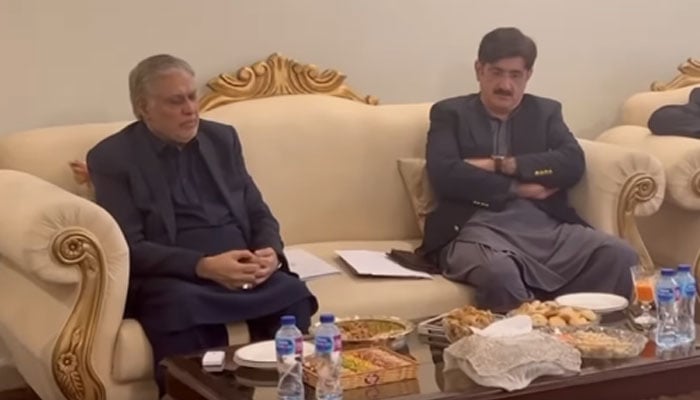Governance — a key concern being discussed by PMLN, PPP for forming govt
Pakistan’s economy is facing perhaps the most formidable challenges in its history
ISLAMABAD: Governance is one of the major issues being discussed between PMLN and PPP for the formation of the government.
Informed sources said that there is a discussion on the point that governance has to be the focus of the new government as the country needs to improve governance without which the challenges facing the nation couldn’t be met.
These sources said that there is a realization that the political party/parties forming the government cannot afford any further lapses in governance. It is being discussed that the economy cannot be fixed without major reformation, the tax base has to be broadened irrespective of political considerations and the business community’s opposition, loss-making state entities are to be privatized or run without any political interference, the mounting debts in the energy and gas sectors are the consequence of bad governance.
A source, who is part of these discussions, said that the governance issues are being discussed to make it clear at this stage that there is no chance for the future government to deliver without addressing them. The past practices of compromised appointments in government entities and politics on economic issues are not the choices anymore.
Pakistan’s economy is facing perhaps the most formidable challenges in its history, an economic expert in the government told The News, adding, that never in Pakistan’s history has the country faced such inflation as in the last two years. CPI (Consumer Price Index) for the second consecutive year is close to 30pc, though it was as high as 38pc for some months.
Because of this persistent inflation, the interest rate has been increased to 22pc and will remain in this vicinity unless the inflation drops. An immediate consequence of high-interest rates is the rising debt and debt servicing burden, so much so that it is fast becoming unbearable. This year, he said, interest payments are estimated at Rs.8.6 trillion. gross federal government revenues are estimated at Rs 12 trillion. After payment of the provincial share in federal revenues, which is estimated at 5.4 trillion, the net revenue would be Rs.6 trillion. This net revenue is short by nearly Rs.2 trillion compared to the interest payments. When even a part of interest payment is met through borrowing, it may well be inferred that the rest of the government expenditures would also be met through borrowings. With rising interest payments, it is said, the budget deficit is also rising and is estimated at 9pc of GDP. With GDP at Rs 106 trillion, the deficit would be Rs 9.5 trillion. If we divide this by 365 days, the daily deficit comes to Rs.26 billion per day.
The government source said that the budget deficit would rise to 10pc of GDP (or Rs.10.6 trillion) if circular debt in the power and gas sectors and losses of SOEs are added to the deficit. It is claimed that the interim government has stabilized the economy by removing major distortions such as speculative activities in the foreign exchange market, smuggling, Afghan transit trade, hoarding etc. This led to a significant rise in business confidence, an unprecedented rise in the stock market, a stable exchange rate and an improved balance of payments. Despite this respite provided by the Interim Government, the source said, the new government would face the challenge of meeting the financing gap in the country’s external account. Besides completing the last review under the stand-by agreement with the IMF, the financing gap beyond March 2024 would require another IMF programme which would put the new government under great strain as it would impose severe austerity.
-
 Courtney Love Makes First Appearance Since New Report On Kurt Cobain's Death
Courtney Love Makes First Appearance Since New Report On Kurt Cobain's Death -
 King Charles Anxious As Uncertainty Grows Over Sarah Ferguson’s Next Move
King Charles Anxious As Uncertainty Grows Over Sarah Ferguson’s Next Move -
 Real Reason Kim Kardashian Is Dating Lewis Hamilton
Real Reason Kim Kardashian Is Dating Lewis Hamilton -
 Rihanna Leaves Elderly Woman Star-struck In Viral Grocery Store Video
Rihanna Leaves Elderly Woman Star-struck In Viral Grocery Store Video -
 TikTok US Launches Local Feed Using Precise Location Data
TikTok US Launches Local Feed Using Precise Location Data -
 Jill Biden’s Former Husband Charged With Wife’s Murder
Jill Biden’s Former Husband Charged With Wife’s Murder -
 Zayn Malik Reveals Parenting Decision Gigi Hadid Criticized Him Over
Zayn Malik Reveals Parenting Decision Gigi Hadid Criticized Him Over -
 Palace Releases Prince William's Photos From Final Day Of His Saudi Arabia Visit
Palace Releases Prince William's Photos From Final Day Of His Saudi Arabia Visit -
 Microsoft Warns Of AI Double Agents As Enterprise Adoption Of AI Agents Surges
Microsoft Warns Of AI Double Agents As Enterprise Adoption Of AI Agents Surges -
 Kate Middleton, Prince William Break Silence Over Tragic Shooting In Canada
Kate Middleton, Prince William Break Silence Over Tragic Shooting In Canada -
 'Finding Her Edge' Star Madelyn Keys Explains Adriana's Remarks About Brayden Romance
'Finding Her Edge' Star Madelyn Keys Explains Adriana's Remarks About Brayden Romance -
 Royal Expert Raises Questions Over Sarah Ferguson's 'plotting' Stunning Comeback
Royal Expert Raises Questions Over Sarah Ferguson's 'plotting' Stunning Comeback -
 Instagram Develops AI ‘Create My Likeness’ Tool To Generate Personalised Photos And Videos
Instagram Develops AI ‘Create My Likeness’ Tool To Generate Personalised Photos And Videos -
 Meghan Markle, Prince Harry Friends Suggest Their Marriage 'isn't All It Seems'
Meghan Markle, Prince Harry Friends Suggest Their Marriage 'isn't All It Seems' -
 Andrew Handed Out 'classified' Information To Jeffrey Epstein
Andrew Handed Out 'classified' Information To Jeffrey Epstein -
 Margot Robbie Recalls Wild Party Days And Getting Kicked Out Of Clubs
Margot Robbie Recalls Wild Party Days And Getting Kicked Out Of Clubs




